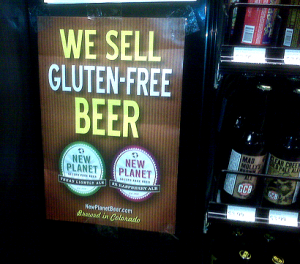Being gluten-free is difficult. Gluten is sneaky. It hides in your favorite condiments, almost all beers, oatmeal, and even beef jerky. When you have the genetic disease, Celiac, that can cause everything from cancer to infertility, the instances when one thinks “Aw, eff it. I’ll just have a beer,” are rare.
But they happen.
As a diagnosed Celiac patient, I can tell you that a bottle of Russian River’s Pliny the Elder will usually tempt me enough that I give in, but the annual tapping of Christmas Ale isn’t enough of a reason to give up my health.
Not everyone who is gluten free needs to be, per se, but they have found it beneficial for their health and rightly so. Gluten causes inflammation to some degree in all humans. Remember that time you gorged on waffles at IHOP and ended up comatose? Yeah, that was gluten. If there were ever a list of “Most Malicious Proteins,” gluten would be number one with a bullet (the previous statement is not based on science). So where does that leave the wheatless and treatless when it comes to imbibing? Well-positioned to drink liquor. And wine. And even some beers which resemble the real-deal, malted-grain, frothy-and-tasty brew that most people *can* drink.
I am often asked if I am able to drink whiskey made from rye, or vodka made from wheat. Here’s a secret: all distilled liquor is gluten free. Some companies will suggest otherwise by labeling a potato vodka with an elegant seal of gluten free approval, but it’s just a marketing ploy. The distilling process used to make spirits and whiskey breaks down the protein so it is safe to drink.
If a drink is made from rice, sorghum, buckwheat, corn, potatoes, or tea (like kombucha beer OMGSODELICIOUS), then it’s also gluten free. Ciders are glutard-friendly, along with all wine, including port, and sherry. So at the very least, those who maintain a gluten free diet can get drunk on delicious gin, fine wines, and crisp ciders of many varieties.
Drinking gets interesting when trying to find beer that is a) gluten free and b) delicious. Having the former without the latter leaves much to be desired when it comes to substitutes, and the latter without the former may as well be poison for someone with Celiac. I’ve tried gluten free beers made from sorghum, rice, buckwheat and combinations of the three, but nothing came close to a beer I tried that was made from barley and then treated with enzymes to reduce the gluten protein to a safe level.
In coming weeks I’ll be reviewing gluten free brews, and dishing on Columbus-area establishments that carry a wide variety of ciders and g-free beer. Stay tuned, fellow glutards.














7 Comments on "Gluten Free and Thirsty: A Primer"
If I ever get my hands on Pliny, I’ll be sure to keep it away from you. 🙂
Thanks for sharing this! Can’t wait to discover gluten-free Columbus nightlife with you.
Please do! I seriously need a keeper. We should definitely share a bottle of Crispin’s the Saint sometime :).
Oh good! Someone who doesn’t cheat as much as I do is writing about this! 🙂
Just to clarify, it isn’t the heat from distilling that breaks down gluten protein, otherwise all beer would be gluten free as they are all boiled. Instead it is that distilling allows for the collection of only those compounds that boil at a certain temperature range. Since ethanol evaporates around 170 F, any alcohol containing product can be heated to this temperature, the vapors collected and condensed. Once the temperature rises up above this point, all the alcohol has been driven off. Many liquors go through additional distillations to discard other forms of alcohol that may have been collected the first time round. Because the only compounds that are collected are ones that evaporated, no proteins of any kind end up in the finished liquor.
Hi Debbie,
Do you know whether you have relatives or ancestors in Minnesota. I was recently diagnosed as celiac and have Bitzan ancestors.
Thanks,
Judy
I don’t know, to be honest. I know of Bitzans in Minnesota, but I don’t know of any who are directly related to me. If you want to chat more, send me an email at dbitzan (a) gmail dot com.
there are people who can cheat? what a cruel world we live in. fuck beer, i just want to eat an oreo cookie without dying.
well, clearly there is no cheating for me., but i do look forward to hearing about beverages that won’t make me keel over. because, you know, not dying is usually pretty refreshing.